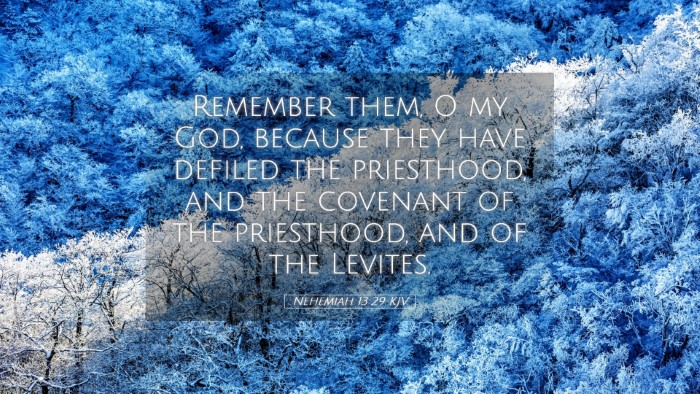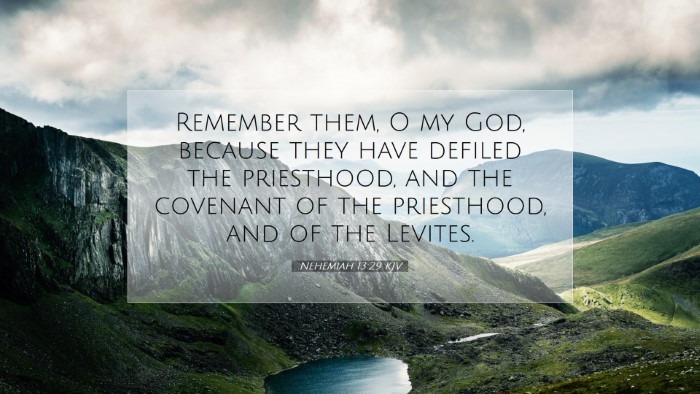Commentary on Nehemiah 13:29
Bible Verse: "Remember them, O my God, because they have defiled the priesthood and the covenant of the priesthood and of the Levites."
Introduction
This verse serves as a poignant conclusion to the book of Nehemiah and highlights the deep concern for the purity of worship and the integrity of the priesthood. The context of this plea from Nehemiah reflects the struggles faced by the returned exiles in maintaining their covenant relationship with God. The verse reveals both the seriousness of the infractions committed against the priesthood and the earnest appeal to God for justice and remembrance of those responsible.
Historical Context
The backdrop of Nehemiah's plea includes the challenges faced by the Israelites after their return from Babylonian captivity. Under Nehemiah's leadership, there was a significant emphasis on rebuilding both the physical walls of Jerusalem and the spiritual life of the community. However, the struggle against compromise, intermarriage, and neglect of the temple was ever-present. The actions that defiled the priesthood involved violations of the sacred covenant which God had established with the Levites and the priestly lineage.
Commentary Insights
Matthew Henry
Matthew Henry points out that Nehemiah's invocation to God reflects a deep desire for accountability, not only from the people but also as a means of earnest intercession. He emphasizes the seriousness of defiling the priesthood, suggesting that it disrupts the divine order and undermines the covenant relationship that is foundational for the community's spiritual health. Henry posits that Nehemiah's call for remembrance contains an implicit acknowledgment of God's justice and the necessity for His intervention in rectifying these grievances.
Albert Barnes
Albert Barnes elaborates on the phrase "Remember them, O my God," noting that this plea emphasizes the weight of responsibility that leaders have in safeguarding the community's spiritual integrity. He argues that Nehemiah appeals to God's memory as a reminder of the covenant, where the failure of the priests and Levites could lead to judgment upon the community. Barnes indicates that the defilement of the priesthood is not merely a personal failing but has communal repercussions that jeopardize the worship and service owed to God.
Adam Clarke
Adam Clarke provides a detailed analysis of the cultural and theological implications surrounding this verse. He highlights the Old Covenant's importance, where the priesthood was set apart for God's service. Clarke elucidates that those who undermine this sacred order trade fidelity for personal gain, and such actions warrant divine remembrance for the gravity of their sins. Additionally, he notes that Nehemiah's cry is a reminder of God's covenant faithfulness and a call to the community to recommit to their sacred obligations.
Theological Themes
- Covenantal Faithfulness: The verse underscores the importance of faithfulness to God’s law and the blessings that come from adherence to the covenant. It invites reflection on the ongoing relevance of the covenant in the lives of believers.
- Holiness of the Priesthood: The priesthood stands as a vital intermediary between God and the people. Any defilement signifies a breach that threatens the worship practices outlined in the Torah.
- Divine Accountability: Nehemiah's plea indicates a belief in divine justice, where God is called upon to remember those who have sinned against His covenant. This accountability reinforces the collective nature of sin within a community.
Application for Today
For contemporary pastors, students, and theologians, Nehemiah 13:29 serves as a reminder of the crucial role that integrity and holiness must play within the church. The cautionary tale of the Levites points to the necessity of maintaining purity in leadership, which influences the entire congregation. The call for "remembering" raises reflective questions about how communities today are preserving their spiritual heritage and covenant relationship with God.
Conclusion
In closing, Nehemiah 13:29 stands as a powerful reminder of the seriousness with which God regards His covenant and the priesthood. It is a call to vigilance against compromise and an encouragement to seek restoration when defilement occurs. God's remembrance, invoked by Nehemiah, encourages the faithful to trust in His justice and to renew their commitment to living in accordance with His divine standards.


